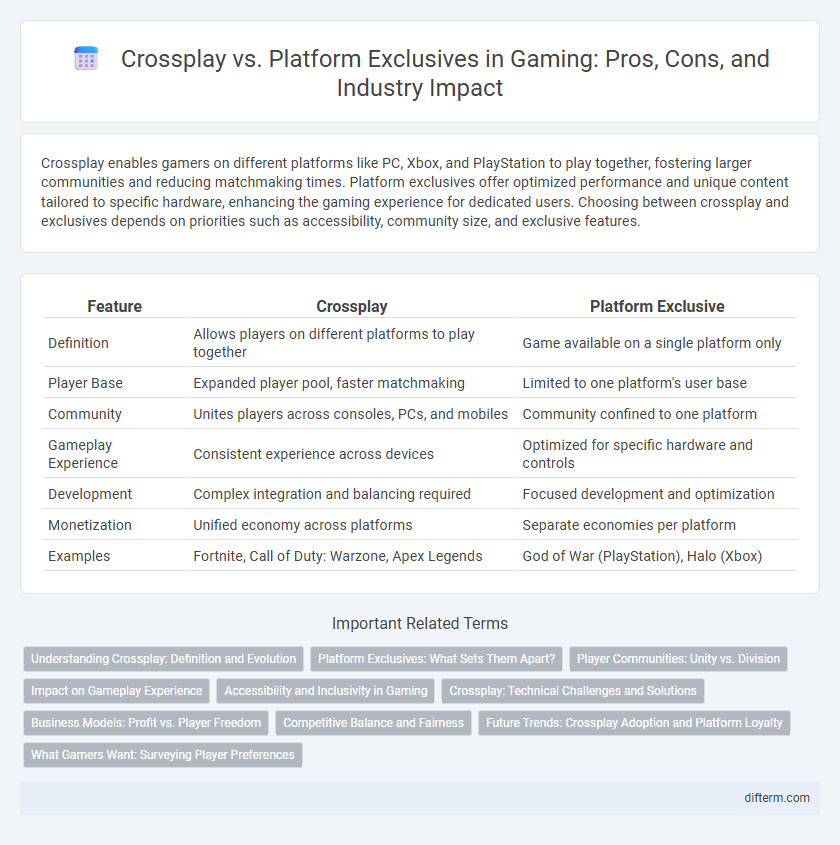Crossplay enables gamers on different platforms like PC, Xbox, and PlayStation to play together, fostering larger communities and reducing matchmaking times. Platform exclusives offer optimized performance and unique content tailored to specific hardware, enhancing the gaming experience for dedicated users. Choosing between crossplay and exclusives depends on priorities such as accessibility, community size, and exclusive features.
Table of Comparison
| Feature | Crossplay | Platform Exclusive |
|---|---|---|
| Definition | Allows players on different platforms to play together | Game available on a single platform only |
| Player Base | Expanded player pool, faster matchmaking | Limited to one platform's user base |
| Community | Unites players across consoles, PCs, and mobiles | Community confined to one platform |
| Gameplay Experience | Consistent experience across devices | Optimized for specific hardware and controls |
| Development | Complex integration and balancing required | Focused development and optimization |
| Monetization | Unified economy across platforms | Separate economies per platform |
| Examples | Fortnite, Call of Duty: Warzone, Apex Legends | God of War (PlayStation), Halo (Xbox) |
Understanding Crossplay: Definition and Evolution
Crossplay enables gamers on different platforms like PC, Xbox, and PlayStation to play together seamlessly, breaking down traditional barriers in multiplayer gaming. Initially limited by hardware and software compatibility, the evolution of crossplay is driven by advancements in network infrastructure and industry-wide collaboration. This shift promotes inclusivity and expands player communities, significantly influencing game design and player engagement strategies.
Platform Exclusives: What Sets Them Apart?
Platform exclusives offer unique gaming experiences tailored to a specific console's hardware and software capabilities, often featuring optimized graphics, exclusive storylines, and gameplay mechanics unavailable elsewhere. These titles leverage proprietary technology and ecosystems to create a distinct competitive edge and foster brand loyalty among gamers. In contrast to crossplay's inclusive multiplayer environments, platform exclusives emphasize curated content that highlights the identity and strengths of a single gaming platform.
Player Communities: Unity vs. Division
Crossplay fosters unity by enabling players from different platforms to connect, expanding player communities and reducing matchmaking times. Platform exclusives often create division, isolating gamers and limiting social interaction to a single ecosystem. Unified cross-platform play encourages diverse collaboration and sustained engagement within the gaming community.
Impact on Gameplay Experience
Crossplay enhances gameplay experience by allowing players from different platforms to compete and cooperate, increasing matchmaking speed and diversifying player pools. Platform-exclusive titles often deliver optimized performance and tailored controls, creating a more polished, consistent gameplay environment. Balancing broad accessibility through crossplay with specialized features in exclusives shapes player engagement and community dynamics.
Accessibility and Inclusivity in Gaming
Crossplay significantly enhances accessibility by allowing gamers on different platforms to connect and play together, breaking down hardware barriers and fostering a more inclusive gaming community. Platform-exclusive titles, while often showcasing optimized performance for specific devices, can limit social interaction and exclude players who cannot access the same hardware. Emphasizing crossplay supports diverse player engagement, creating equitable opportunities for participation regardless of device preference or financial constraints.
Crossplay: Technical Challenges and Solutions
Crossplay faces technical challenges such as synchronization of game states across different hardware, latency discrepancies, and platform-specific restrictions on data sharing. Developers address these issues by implementing standardized matchmaking protocols, optimizing network code for diverse connection types, and negotiating cross-platform agreements for seamless communication. Solutions like cloud-based servers and unified player identity systems enhance crossplay compatibility and provide a consistent gaming experience regardless of device.
Business Models: Profit vs. Player Freedom
Crossplay gaming fosters player freedom by enabling users to compete across multiple platforms, thereby expanding the player base and promoting longer game lifespan. Platform-exclusive titles often prioritize profit through controlled environments that drive hardware sales, subscription services, and in-game purchases unique to a single ecosystem. Balancing these business models requires studios to weigh the benefits of broad market reach against the potential for higher revenue per user within exclusive platforms.
Competitive Balance and Fairness
Crossplay gaming enhances competitive balance by allowing players from different platforms to compete on a unified skill-based ranking, reducing skill disparities seen in platform-exclusive pools. Platform exclusives often face fairness challenges due to hardware differences, input methods, and network capabilities that can advantage certain players. Ensuring equal matchmaking criteria and input type restrictions is crucial for maintaining fairness in crossplay-enabled competitive games.
Future Trends: Crossplay Adoption and Platform Loyalty
Crossplay adoption is accelerating as developers prioritize seamless multiplayer experiences across consoles, PC, and mobile devices, driven by growing demand for unified player communities. Despite this trend, platform loyalty remains strong among certain gamer segments influenced by exclusive content, performance optimization, and brand identity. Future innovations will likely balance crossplay functionality with tailored platform-exclusive features to maximize both engagement and revenue streams.
What Gamers Want: Surveying Player Preferences
Survey results reveal a strong gamer preference for crossplay functionality, with 78% of players favoring titles that allow seamless interaction across multiple platforms, enhancing matchmaking speed and community size. Conversely, platform exclusives attract 22% of respondents who value optimized performance and unique content tailored to specific consoles. Developers prioritize these insights to balance broad accessibility and exclusive experiences that cater to diverse player demands.
crossplay vs platform exclusive Infographic

 difterm.com
difterm.com